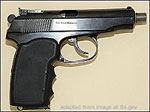Pistols at dawn: Until the police can be trusted, more Russians will want guns

(Moscow News – themoscownews.com – Konstantin von Eggert – April 2, 2013)
“If you outlaw guns only outlaws will have guns’ so goes the famous slogan of the National Rifle Association in the US. Until recently, few people thought that this would ever be a contentious issue in Russia. But the case of Alexandra Lotkova, a 21-year-old Moscow student, is stoking the fire of a debate that will eventually spill into the open.
Lotkova was jailed for three years last month because she injured a man with a shot from a travmatichesky pistol, or “non-lethal firearm.” Lotkova claims that she was defending a friend who had been beaten and injured with a knife by two young men, Alexander Belousov and Ibragim Kurbanov. The two were injured by her shots, one seriously.
Belousov and Kurbanov say they did not threaten anyone with a knife and that they were shot at point blank range. Recordings from closed circuit video cameras inside the metro station where the brawl took place provide some clues as to what happened (it seems Kurbanov did indeed have a knife) but are not 100-percent conclusive. The court sided with the prosecution in accusing Lotkova of “aggressive behavior” and “intention to cause bodily harm,” while her lawyers insisted that she acted in self-defense.
It did not help, of course, that one of the victims of the shooting, Kurbanov, has a Muslim name. Although there is no evidence of the incident having any element of ethnic strife about it, Russian nationalists started a campaign, portraying Lotkova as a “typical victim of ethnic savagery unleashed by thugs from the North Caucasus.”
Guns and ethnic tensions are a dangerous mix anywhere. In a society as atomized and mistrustful as contemporary Russia, this cocktail could be lethal. The number of Russians advocating the right to bear arms American-style has been steadily growing in recent years. According to some polls, the idea is supported by more than 50 percent of the adult population. Incidents like the one involving Lotkova are bound to increase their numbers.
Nationalists are at the forefront of the pro-gun trend. However, this proposition has also found resonance among those who do not necessarily share nationalist views. The growing middle class feels it is insecure enough to feel the need for firearms and mature enough to use them responsibly.
Opponents of this view point to high levels of alcoholism, drug use and violence. They claim that introducing real guns will lead to a spike in violent crime. Some of them go further and say that even non-lethal weapons should be banned. The reason: “People use them too freely because they are convinced no one will be killed.” Which is, of course, frequently not the case.
All these people, regardless of differing opinions, have something in common: They do not trust the police, whom the majority of Russians consider to be inefficient and corrupt. CCTV footage from the site of Lotkova’s shooting shows a policeman arriving on the scene very late and being at a loss as to what to do. As people lose count of the attempts at law enforcement reform, the number of those advocating a more lenient attitude to firearms will continue to grow.
This may eventually pose a political challenge to the Russian authorities, especially if a party bent on legalizing guns eventually gets enough seats in the State Duma to lobby for the passage of such a law. This may not be an issue for tomorrow, but it is one that, I am sure, will eventually become a topic for Russiawide debate. The Russian version of the NRA has quite some potential indeed.
